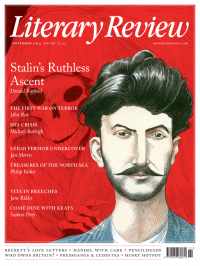Robert Colls
Our Island Stories
The English and Their History
By Robert Tombs
Allen Lane/The Penguin Press 1,024pp £35
Have you forgotten Ethelbreth? Do you have difficulty remembering dates? Do you find television historians interesting in any way? Do you feel sluggish? Do you feel postmodernism has lost the plot? If the answer to all these questions is yes, then this book is for you. It’s the perfect pick-me-up. In fact, I could hardly put it down.
This is certainly the right time to write a history of the English, and Tombs proves he is equal to the task in choosing to write it in the way that the English have chosen to remember it – which is, or which was, as a story where all that matters is that they are a free people who go on being free. This makes his job straightforward but not easy, partly because the story is not entirely true and partly because they were not just a people but a powerful state engaged in the world.
Starting off in a blue-tattooed land called Pretannike (the name, he explains, may derive from the Celtic term for ‘tattooed folk’), Tombs gets from 320 BC to the Reformation in a brisk 161 pages. He deals with it and the Civil War in just over a hundred. He then takes

Sign Up to our newsletter
Receive free articles, highlights from the archive, news, details of prizes, and much more.@Lit_Review
Follow Literary Review on Twitter
Twitter Feed
Under its longest-serving editor, Graydon Carter, Vanity Fair was that rare thing – a New York society magazine that published serious journalism.
@PeterPeteryork looks at what Carter got right.
Peter York - Deluxe Editions
Peter York: Deluxe Editions - When the Going Was Good: An Editor’s Adventures During the Last Golden Age of Magazines by Graydon Carter
literaryreview.co.uk
Henry James returned to America in 1904 with three objectives: to see his brother William, to deliver a series of lectures on Balzac, and to gather material for a pair of books about modern America.
Peter Rose follows James out west.
Peter Rose - The Restless Analyst
Peter Rose: The Restless Analyst - Henry James Comes Home: Rediscovering America in the Gilded Age by Peter Brooks...
literaryreview.co.uk
Vladimir Putin served his apprenticeship in the KGB toward the end of the Cold War, a period during which Western societies were infiltrated by so-called 'illegals'.
Piers Brendon examines how the culture of Soviet spycraft shaped his thinking.
Piers Brendon - Tinker, Tailor, Sleeper, Troll
Piers Brendon: Tinker, Tailor, Sleeper, Troll - The Illegals: Russia’s Most Audacious Spies and the Plot to Infiltrate the West by Shaun Walker
literaryreview.co.uk